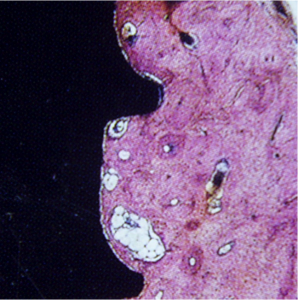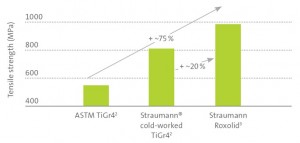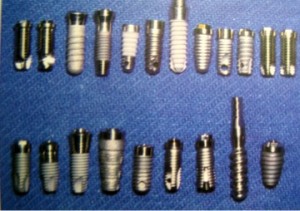
What holds the implant in the bone?
The term is called osseointegraton. It is a stable bond between bone and titanium. The connection is very strong, as the bone contact is very close to the titanium surface, at about one-billionth of a metre. Below is an image of titanium implant integrated to bone. Titanium is dark, bone is pink due to microscope staining.
Are implants ever rejected?
Implants made of pure titanium have very low corosion and are not rejected. The titanium in contact with your bone is actually a microscopic layer of inert ceramic titanium oxide. It is this oxide layer that bonds to the bone. The oxide layer is very stable and maintains bone implant bond over time. The risk for titanium allergy is extremely rare and in the millions placed annually there is minimal data showing true allergy to pure titanium dental implants.
Can any dentist place an implant for me?
Yes, but there is variability in experience and training with implant surgery. Periodontists and Oral Maxillofacial Surgeons have taken 2+year graduate level training in surgical procedures. Also, for every procedure there is a “learning curve” and for complex cases like immediate implants, sinus lifts and bone grafts it is advised to consider practitioners with advanced training and experience.
Are all dental implants the same?
No, and the variations in material and shape will affect success rates. The most common material is pure Titanium it has well proven biocompatability. Some systems use titanium alloy with Aluminium-Vanadium (Ti-Al-Va) but they do not bond bone as well. There is a new improved alloy of Titanium-Zirconia that increases strength and also improves bone bonding ( straumann roxsolid ), this is now our most commonly used implant material.
There are hundreds types of implants including; bullet shape, straight screw and tapered screw but most have no research. The various shapes can affect success rates.
Using a proven implant with 5 years research is advised since complications increase over time. Such systems as Straumann, Nobel Biocare, 3i and Astra are active in research (see our research section). Using a proven system is more important than ever as there is a trend to discount implants that may be used in “Tourism Dentistry” locations as well as in Canadian offices.
How long will implants last?
Like teeth, they could last a lifetime but there are many factors affect long term success. Research over the past 15 years report implant survival rates > 90%. Some factors we can control such as accurate diagnosis, treatment planning, implant type and surgical technique, but patient risk factors like systemic and oral health may not be in the Dentist’s control. As well, even with surviving implants complications rates of 10% are reported ( ie: bone loss , infection, screw breakage). Dental implants can get gum disease so proper home care and routing dental exam is critical. There are no guarantees, but by choosing a skilled practioner, using a research proven implant and living a healthy lifestyle you can improve your success.
If my implant is loose has it failed?
Yes, a loose implant is a failed implant. Implants bond to bone so should have no mobility. A loose implant must be removed to prevent further bone loss and efforts to fix a loose implant only worsen the correction. A bone graft may be needed to allow a replacement implant, by definition a complex case so specialist consultation may be considered.
Are implants covered by my insurance?
Each patient’s insurance plan has different things they cover. Our administration team will give you the proper paperwork to submit to your insurance company so you can maximize your benefit. You then can follow up with your insurance company to verify your coverage.
Is it painful to get implants placed?
Implant placement is done with local anesthetic so is not painful during placement and afterward typically does not result in much pain. It is comparable to having a tooth extracted and managed with 2-4 days of prescription pain medication and a soft diet. If bone grafting or complex treatment is completed then there may be more pain and swelling so medication may be needed for about 7 days. Usually patients can resume normal activities after 2-3 days. See our detailed post operative care sheet. pdf post op sheet.
I travel out of town, do I have to restrict my travel plans?
We usually recommend you stay in town for 2 weeks post operatively, after that you can resume your normal travel schedule. Keep in mind that the implants will need to be evaluated at 2-3 months after surgery to verify bone integration before the final crowns at your Dentist.
How long do I have to go without teeth?
It varies from “same day” to 6 months.
The most common scenario is 3 months from implant to final crown if the tooth is already missing. In some cases you can have the extraction, implant and temporary crown the same day , a procedure referred to as “immediate implants” or “teeth in a day“. While in some cases it takes 6 months (3 mos for extraction healing then 3 months for implant healing). Your dentist will make a removable appliance ( partial denture) while the implant heals. The timing affects success rates so the decision to immediate is an important part of treatment planning as it can increase risk for implant loss in some cases.
Can I have implants placed the same day as my teeth are extracted?
In certain cases we can place an implant at the same time that we extract the tooth. Generally this is done on teeth with only 1 root ( on front teeth). There must also be good bone beyond the root and no infection present. The timing of the implant can affect success rates so the decision to immediate is an important part to treatment planning.
Do I need a sinus lift or bone graft?
In some cases the bone may be missing volume so a bone graft is needed, this is a complex procedure and requires a skilled surgeon as it can affect success rates.
In some sinus cases a more conservative osteotome elevation can be done rather than bone graft placed in sinus. This technique does not require two stages of surgery and does not need bone graft. Dr French has been researching this techniqe and has two research papers that help to define the expectations and parameters of this procedure.
Do I need a socket bone graft if my tooth is extracted?
Though there is some benefit in “preserving” ridge dimension, in many site it is not required. A bone graft in a socket adds cost and gains only 2mm bone width on average compared to a non grafted socket. Furhtermore there is no long term data on whether socket grafts have comparable success as compared to naturally healed bone. In our clinical experience we have found that after extraction in our practice 1/3 sites needed a bone graft for implant so we usually prefer to graft the site only if needed after the area has healed. see contorversies in our research section.
How long is the procedure?
The procedure is done in our office with local anesthesia and takes about 1 hour for a single implant. More complex multiple site or bone graft cases can take 2-4 hours.
Do I get “put under” for the procedure?
Most of our patients find they do not require sedation. However if you are anxious we offer carefully monitored oral sedation. This can be discussed in detail at your consultation. Generally if you are comfortable with regular dental procedures like fillings or extraction then sedation is not required.
Is my case a complex implant surgery?
Complex implant cases involve bone grafts, sinus lifts, multiple-sites ( >3 implants) or visible areas ( front tooth).
If your case is complex it is affects success rates so it is important for you to ask the Implant Surgeon about their training and experience relative to your case. With suitable training all General Dentist can place dental implants. Howevers, some Dentists may choose to refer implant surgery to Periodontists and Oral Maxillofacial Surgeons while others may do implant surgery for straightforward cases and refer complex surgical cases.
How much do implants cost?
The fee for tooth replacement with dental implants will depend on several factors, including the number of teeth being replaced and the number of implants required to support your replacement teeth. Typically, there is a fee of for the surgical procedure and a separate fee to attach the abutment posts and crowns. The implant surgery alone is about $2500 while the total fee ( implant + abutment + crown) can vary but is generally $4500-6500 per implant. To obtain a specific fee estimate, it is necessary to have a doctor examine your mouth. After a thorough diagnostic examination, your dentist will recommend the treatment that is best for you and inform you as to what your potential investment would be for the procedure. The costs are comparable to saving a badly damaged tooth that may need a surgical gum reduction, root canal, post and crown. An implant will usually provide a better prognosis than fixing a badly damaged tooth.
Will anyone be able to see if I have an implant?
Maybe. In most cases we can get a very good match to the adjacent teeth but some factors like light translucency, gum line contour and colour can be difficult to get exactly like natural. This is why implants at upper front teeth are considered “complex” and require expertise from both the surgical and restorative dentist.
Do I need a referral to get an exam with Dr French?
Most of our cases come via referral from the Dentist, but we are pleased to see new patients directly. Please call our office so we can welcome you for your first visit. ( 403) 247-8656.
My lower denture is very loose, can I still get implants?
Yes, the bone in the lower arch is almost always suitable for implant support. A loose denture is an ideal scenario for dental implants with options from cost effective 2x implants “snap-on” denture to more complex solutions like fixed bridges on multiple implants.



